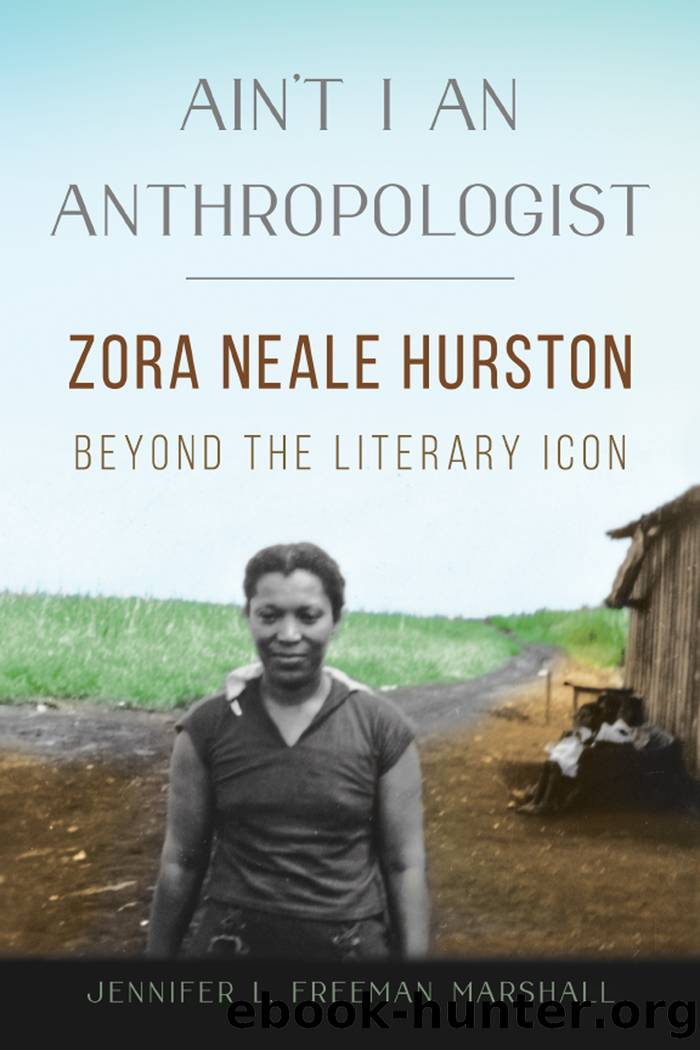Ain't I an Anthropologist by Jennifer L. Freeman Marshall

Author:Jennifer L. Freeman Marshall
Language: eng
Format: epub
Tags: Social Science / Ethnic Studies / African American Studies
Publisher: University of Illinois Press
Published: 2023-02-28T00:00:00+00:00
5
Mules and Men
âNegro Folklore ⦠Is Still in the Makingâ
Contemporary Black feminist anthropologists have called for a consideration of Hurstonâs anthropology within contemporary critical frameworks such as global or transnational perspectives (Mikell [1990] 1999, 66; Bolles 2001, 31). This approach, they suggest, might inform the disciplinary consideration, if not contemporary recuperation, of Hurstonâs ethnographies within the anthropological canon. I offer an alternative response to that call, which instead considers Hurstonâs ethnography Mules and Men within the historical contexts of its production. These contexts include a demand for studies among early African Americanists that would appeal to non-academic audiences by featuring narrative dialogue in ways that paralleled the widely popular literary realism found in fiction of that time, along with a critical interest in treating these narratives as data to illuminate traditional beliefs, knowledge, attitudes, and practices of Black people.1 Hurstonâs representation of African American culture in Mules and Men challenged common myths of Black inferiority. She demonstrated that, while shaped by the legacies of slavery, plantation life, and African retentions, Black cultural traditions are not determined by these contexts. They remain dynamic and evolve: âNegro folklore is still in the makingâ (Hurston [1934] 1995, 836). Hurstonâs assertion that African American culture is generative and complex challenged prevalent attitudes that âNegroâ culture was essentially derivative and uncomplicated in its expression.
Readings of Hurston that do not explore the more immediate professional context in which she worked tend to obscure the critical conversations with which she engages within and through her ethnographies. In addition, as her letters reveal, Hurston was aware that she was producing ethnographic works for a popular audience that would include specialists and generalists who would âreferenceâ her findings in future studies (Kaplan 2002, 308, 389).2 Therefore, I must ask, should we compare Hurstonâs professional/ethnographic authority against a standard that she never sought to emulate? When Hurston wrote Mules and Men, for example, are we to assume that she was without critical agency, wholly subject to the demands of her publisher, patrons, and mentors? Should we presume that she was merely resigned to write a âtextâ that, consequently, defied ethnographic conventions and eclipsed its cultural content, as so much of the literature concerning her ethnographic production and anthropological experiences suggests? Can we, instead, imagine that Hurston put pen to paper and deliberately crafted (from her exhaustive field notes) a distinctive statement about Black folk life and culture within her ethnographies? Can we imagine that her content (and approach) was informed by, and even revised, prevailing concepts of culture during the period? What were those concepts? What was her statement? This chapter reveals some of the ways that Mules and Men can be read as an ethnographic representation of Black folk life and culture when the historical contexts of its production are more closely considered and when Hurstonâs intellectual agency is centered.
Hurstonâs ethnographies are often evaluated as highly unusual, receiving either âtwice as much praise or twice as much blame,â in Hurstonâs words, because they are read apart from trends in the study of African American culture during the era of their production ([1928] 1995, 827).
Download
This site does not store any files on its server. We only index and link to content provided by other sites. Please contact the content providers to delete copyright contents if any and email us, we'll remove relevant links or contents immediately.
4 3 2 1: A Novel by Paul Auster(12370)
The handmaid's tale by Margaret Atwood(7752)
Giovanni's Room by James Baldwin(7320)
Asking the Right Questions: A Guide to Critical Thinking by M. Neil Browne & Stuart M. Keeley(5757)
Big Magic: Creative Living Beyond Fear by Elizabeth Gilbert(5753)
Ego Is the Enemy by Ryan Holiday(5412)
The Body: A Guide for Occupants by Bill Bryson(5079)
On Writing A Memoir of the Craft by Stephen King(4927)
Ken Follett - World without end by Ken Follett(4720)
Adulting by Kelly Williams Brown(4564)
Bluets by Maggie Nelson(4546)
Eat That Frog! by Brian Tracy(4522)
Guilty Pleasures by Laurell K Hamilton(4439)
The Poetry of Pablo Neruda by Pablo Neruda(4093)
Alive: The Story of the Andes Survivors by Piers Paul Read(4017)
White Noise - A Novel by Don DeLillo(4001)
Fingerprints of the Gods by Graham Hancock(3991)
The Book of Joy by Dalai Lama(3972)
The Bookshop by Penelope Fitzgerald(3843)
